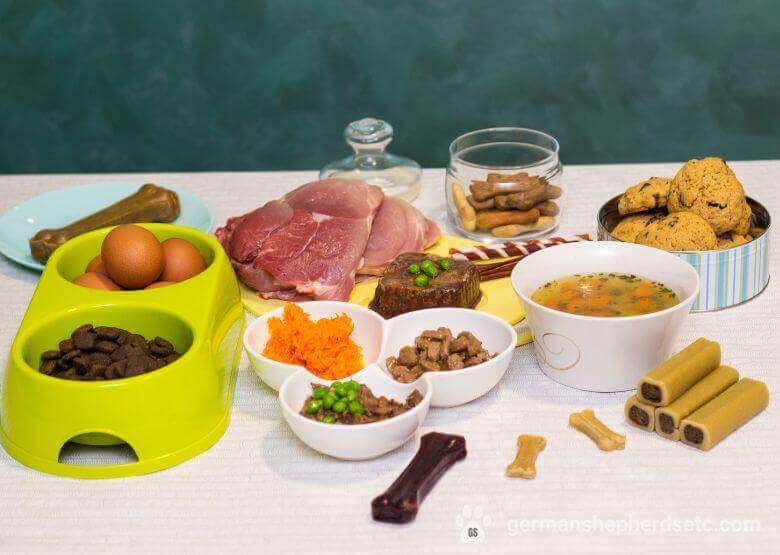Table of Contents
You can feed your graceful and intelligent German Shepherd dog with cheap kibble that you can buy in any grocery store. It’s your choice, of course. However, it is not the best one for such a perfect breed. Though, do not strive to buy the trendiest and most expensive food, either. Let’s have a look at the nutritional needs of your pup at different stages of its life and the tips you can use to help your pet remain healthy and active throughout its whole life. This German Shepherd feeding guide may help you a lot.
What Are the GSD Nutritional Needs?
Every breed has specific nutritional needs. For example, small breeds need something different from large ones. The choice of food depends on several factors. These factors are similar to all breeds, so they can also concern German Shepherd dogs. They involve the size, age, activity, and health considerations.
Size
German Shepherds belong to middle-sized breeds, though the AKC tends to relate them to medium to large ones. The standard GS dog is as tall as 27 inches (68 cm), the weight is 67-89 pounds (30-40 kg) for males and 50-72 pounds (23-33 kg) for females. Due to their energetic way of living and a lot of exercises, these dogs have an excellent appetite.
Age
Each stage of life requires high levels of nutrients and energy for these dogs. They grow very fast during the first half of the year after their birth. They especially need a lot of protein and calcium at a younger age. So, the food should correspond to the age and the growth speed.
Activity
Levels of activity influence the amount of food. German Shepherds are energetic and agile. They need highly caloric feeding in the same way as a professional human athlete, who would not survive on cheap snacks. If you want your doggie to stay healthy and active throughout its entire life, avoid cheap generic kibble.
Health
German Shepherds are prone to different health issues when they grow older. Though, you can prevent many of them with the help of healthy food. One of such issues that can be prevented by a healthy diet is arthritis, which results from elbow and hip dysplasia. The condition is mainly inherited, so you cannot completely prevent it, but healthy feeding can help a lot.
There are other musculoskeletal disorders that can be prevented. Many of them emerge from malnutrition and inflammations. The deficiency of calcium or phosphorus can also be a cause.
If there is too much protein in the diet, your dog can suffer from kidney disorders. If the food is of poor quality, pancreatitis can appear and shorten your pet’s life. You can consider other disorders and the possibility to prevent them with perfect nutrition. You won’t save too much money buying your dog cheap food. Vet bills will be much higher.
General Guidelines
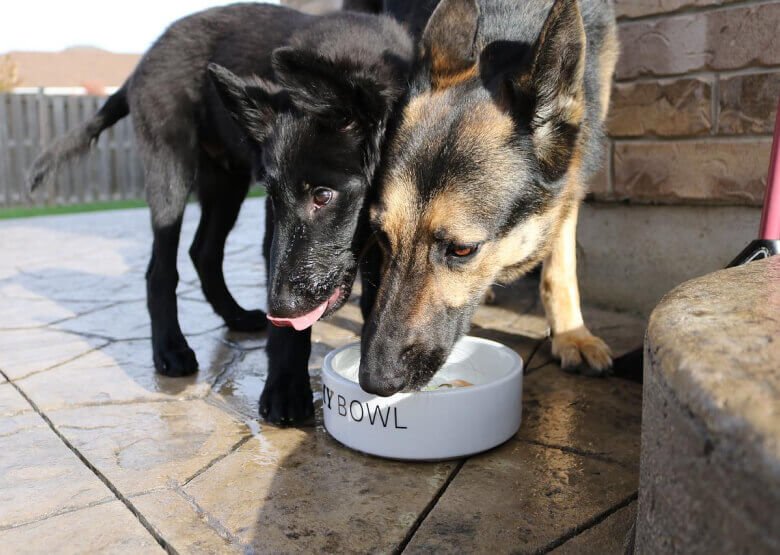
The most essential tip all vets are ready to give you is to watch your dog thoroughly while deciding how to feed it. You need to know your Shepherd’s health condition and its parameters without strictly following all provided charts of feeding.
If your puppy is gaining weight quickly, try to reduce the amount of food and number of calories. It can be a reduction in treats or any other scraps, or the amount of food for regular meals.
On the other hand, if you see that your pup is too thin and lethargic, you may need to increase the amount of food. The initial increase may not be too sufficient – just a ¼ cup is enough for every meal.
Try not to make any dramatic changes in your dog’s diet at once. Do everything gradually, for several weeks, because too abrupt changes can cause health problems.
To know how to count the amount of food related to your adult dog’s weight, you may use the following German Shepherd feeding chart:
| GSD Weight | Food Amount |
|---|---|
| 10-30 pounds (4.5-13.5 kg) | 1 ¼ – 2 ¼ cups per day |
| 30-50 pounds (13.5-23 kg) | 2 ¼ – 3 ½ cups per day |
| 50-80 pounds (23-36 kg) | 3 ½ – 4 ½ cups per day |
| 80-100 pounds (36-45 kg) | 4 ½ – 5 cups per day |
| Over 100 pounds (over 45 kg) | 5 cups plus ½ cup per each additional 1-20 pounds of weight |
These measures are suggested for a day, but not for one meal. You may split these amounts as you like. However, the differences in measurements are big, so you need to watch your dog’s parameters but not a bowl to decide how much food to give it.
You can begin with the lower amount and increase it if needed. You can also measure the amounts according to the age of your puppy:
| GSD Age | Food Amount | Number of Meals per Day |
|---|---|---|
| 8-11 weeks old | 1 to 1 ½ cups | 4 daily meals |
| 12-23 weeks old | 1 ½ to 2 cups | 4 daily meals |
| 6-9 months old | 2-3 cups | 3 daily meals |
| 9-12 months old | 3-3 ½ cups | 3 daily meals |
| 12 months+ old | 3 ½ – 4 cups | 2 daily meals |
Once again, these measurements are pretty approximate. A lot depends on your dog’s activities and lifestyle. Very active puppies may need more calories, and dogs that are lazy and slow may need fewer.
There is one more important tip here – feed your dog at the same time every day. If it does not eat its meal completely, take away the dish after 10-15 minutes. You can offer the same meal once again in an hour or so.
Feeding a German Shepherd by Age
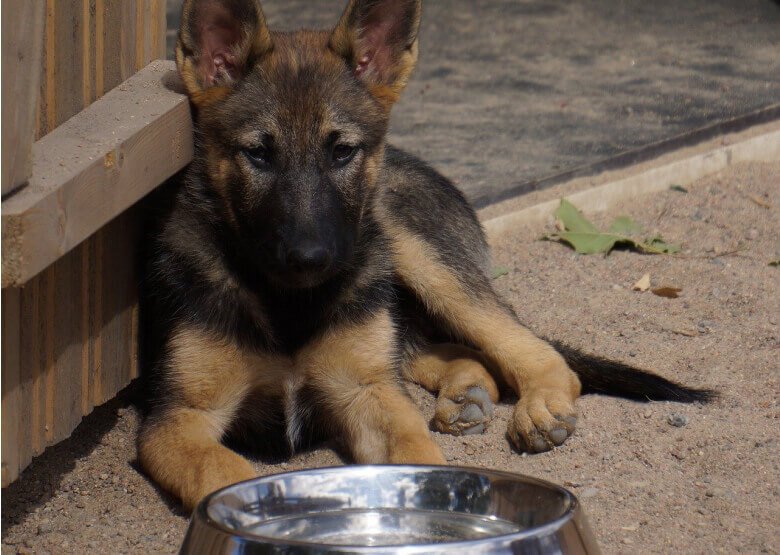
Age plays a great role in your choice of food amounts and feeding style. The information you will find below is a sort of recommendation. You also need to talk to your vet before you start the feeding program or make any changes to it.
All in all, an adult German Shepherd should consume 1,275-2,150 calories per day. Older and slower dogs can receive about 1,350 calories, not to gain weight. Though, older Shepherds that are still active and energetic may need around 1,700 calories.
Nevertheless, how much to feed a German Shepherd puppy? The answer is pretty surprising. Puppies need twice as many calories per day as adult dogs. For example, a little one aged only 10 weeks can eat double amounts of food in comparison with an adult GSD, related, of course, to their size and weight. It happens because puppies need a lot of calories to grow and develop.
When a puppy is four months old, its intake of calories slowly decreases. To compare, while a one-month-old puppy needs 80-90 calories per pound of weight, a four-month-old doggie will consume only 40-60 calories. You need to weigh your puppy every day to follow the growth progress and the overall body condition.
Young German Shepherds are even busier than adult working dogs. They continuously run around, explore the world, chew everything they can reach, play, and learn many things. All this requires extra energy. That is why, when you choose the food for your growing puppy, look through labels and guidelines carefully. The number of calories may differ from one manufacturer to the other.
Let’s consider the number of calories your puppy may need by its age in this German Shepherd puppy feeding chart:
| Age of a Puppy | Number of Meals per Day | Average Number of Calories |
|---|---|---|
| weaning – 12 weeks | 4 per day | 1,200-2,400 calories |
| 3-6 months | 3 per day | 2,000-2,200 calories |
| 6-12 months | 3 per day | 2,700-3,900 calories |
| 12-18 months | 2 per day | 3,300-4,250 calories |
However, remember that this is an average chart for an average puppy. You can find such recommendations on every food pack from different manufacturers. As for your individual pup, watch its growth and condition to understand exactly how much food it needs.
Now, let’s speak about the GS puppy’s needs according to its age.
Birth to 3 Months
At this age, it is vitally important for the puppy to stay with its mom. The ideal time is about 8-10 weeks when you can take the little one from its mother. Let’s be more specific about this period.
When the Pup Is 6 Weeks Old
This is the period of nursing. However, at this age, you can introduce little portions of wet foods. The puppy gets all the nutrients from its mother’s milk, which works as an antibiotic to protect it from an unfavorable environment.
More about 6 week old GSD puppy feeding.
A 2-Month-Old Puppy
You can take the little doggie from its mum and start giving it puppy mush. It is kibble with goat’s milk to make it softer. Goat’s milk is very useful due to its vitamins and minerals. Try to avoid cow’s milk because it can cause gastrointestinal problems. Goat’s milk, on the contrary, can be used throughout the dog’s entire life to develop healthier eating habits in it.
At this age, your pup can start eating more solid food. You can add cooked oatmeal or several spoonfuls of canned pumpkin, too. Since this is the age when the puppy is weaned from its mother’s milk, you should be very careful to let it receive all the necessary ingredients with other kinds of food. Make them gradually drier every other day.
It is also important that you continue giving your doggie the foods the breeder used for at least several weeks, adding something new in tiny portions. It will help avoid gastrointestinal distress.
More about 2 month old GSD puppy feeding.
When the Puppy Is 10 Weeks Old
You can continue with the previous diet at this time. Try not to change the brand of your puppy’s kibble if you observe positive results. You can introduce treats to establish closer relationships with your little dog. The only thing you need to watch is the number of calories the little one receives. If you assume that your pup is a bit overweight, stop giving treats to it for a while.
Until your doggie is 12 weeks old, you can switch it from the food the breeder used to give to it to your most preferable food. Do it gradually and without too much hassle. Use ¾ of the previous food and only ¼ of the new one. Increase the amount of new food continuously so that by the end of the 12th week, your pup can fully eat the new food.
3 Months – 6 Months
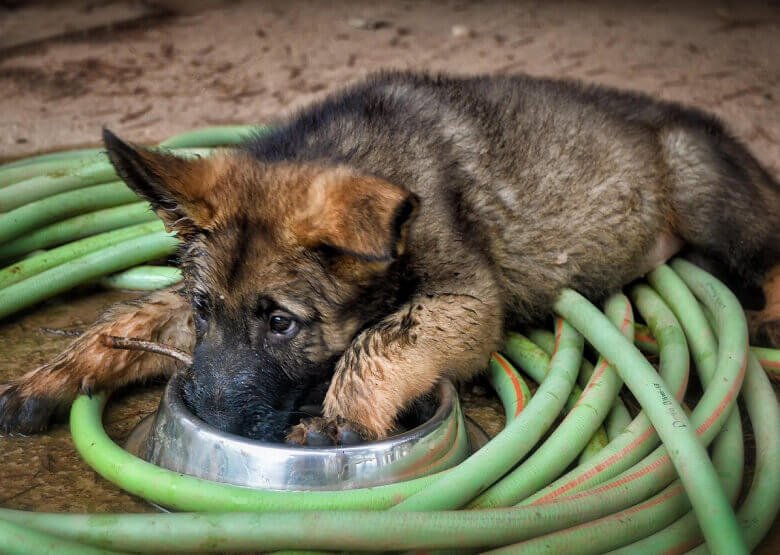
Now, you can begin to teach your puppy to eat at certain times of the day, with set amounts of food that are usually fewer. You cannot allow your doggy to eat whenever it wants because they tend to overeat. That can lead to severe health problems and overweight. Consult with your vet about when and how much food to give your dog. The vet can observe the health condition and parameters of the puppy, and recommend the appropriate feeding routine.
12-13 Weeks of Age
You can continue to feed kibble and goat’s milk to the puppy but watch its weight carefully. If your doggy gains weight quickly, it can have problems with its joints, bones, and gastrointestinal. Use the dog’s energy to teach it different exercises and stay more relaxed with a special training technique. That can prevent overweighting. Consider that the German Shepherd’s diet at this age should be more balanced and rich in nutrients, though, to help it grow and develop.
At the end of this period, the puppy will look more like an adult dog. It means that you can reduce the times of feeding from 4 to 3.
More about 3 month old German Shepherd puppy feeding.
14-15 Weeks of Age
Watch your puppy’s physical development carefully. It should grow strong and athletic. That depends on how much you feed the dog. Add pieces of raw carrots or apples to the diet or as a treat. You can write down how much food you give it for a portion to know whether it is enough for its healthy growth. Also, remember the exact times. If the pet gulps down the food, you can be sure that you don’t give it enough. However, if your puppy continues screaming after it is full, try to ignore that to avoid overeating. 3 meals per day is pretty enough at this age.
16-17 Weeks of Age
During this period, your puppy becomes bigger, and the portions of food you give it may not be enough. Watch whether your pet eats too fast and then looks for more food. If it is the case, think about adding a handful more to the usual amount of kibble.
You also need to be careful about the number of treats your puppy obtains during the training process. Treats often contain more calories than needed, so you need to monitor them. Start training your young dog to walk on a leash obediently, or it will soon start pulling you heavily down the road. If your GSD is strong enough to do that and does not know the manners, some treats can help in training.
You should not change the number of meals. 3 meals per day are sufficient.
More about 4 month old German Shepherd puppy feeding.
18-19 Weeks of Age
Now, your puppy is big, so you can start weighing it on a scale. Hold it in your arms and stand on the scale together. Then, let it go on the floor and weigh yourself without it. The difference between these two weights is your dog’s weight.
Your puppy grows rapidly at this time, so repeat this procedure every other day to follow the weight and avoid overfeeding. Fast growth together with big weight can lead to worse damage to the bones and joints of your pet. Feed your pup 3 meals per day as usual. It’s not time yet to reduce this number.
20-21 Weeks of Age
When your puppy is over 5 months old, its weight has considerably increased. The body plumps up and fills out. However, watch the pup’s belly – it should not be round at this time. The wist has to look trim and fit, without rounded sides. Still, feed your dog 3 meals per day at certain times.
More about 5 month old GSD puppy feeding.
22+ Weeks of Age
At the end of the 21st week, you can start to reduce the tasty toppers in the doggy’s diet. Continue feeding it with the dry kibble with a small amount of goat’s milk, as usual. You will see when to reduce the number of feeding times. The dog may not be ready for that at this age.
6 Months – 12 Months
The growth of your pup at this age slows down, so it does not need additional calories anymore. So, you can try to reduce the feeding times to 2. However, watch its height and weight carefully. Be sure that your dog is active and energetic.
More about 6 month old German Shepherd puppy feeding.
Continue feeding the GSD with the puppy food. Though, you can buy a pack of adult food and use some kibble as treats or rewards while training. In this way, your pet will get accustomed to the new taste and texture.
When your pup is 9 months old, start adding this adult formula to its usual puppy food. Do it gradually and continue this until your dog is 12 months old. At this time, you can transfer it entirely to adult food.
Though, you need to speak to your vet before making such a decision. The doctor who observes your puppy can tell you for sure if it is mature enough to eat the adult formula and whether it is safe for it. Some German Shepherds can eat puppy food until they are 2 years old because of some specific conditions, so you need to be very careful.
Adult Years
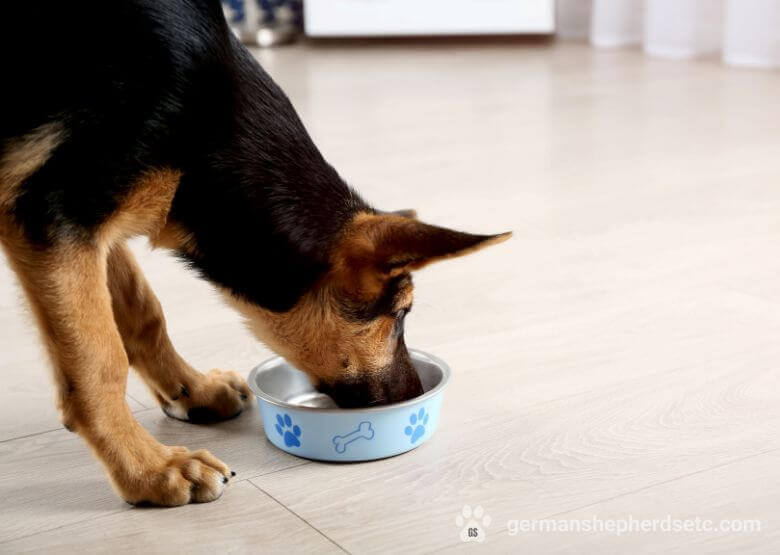
When your GS puppy is mature enough and can be considered an adult, it can start eating completely adult food. It should be well-balanced, with appropriate ratios of protein, calcium, phosphorus, and other nutritional substances for its further development.
Do not feed your adult dog with puppy formula. It can lead to obesity, kidney and liver problems, and other health issues. However, it will not be catastrophic if your adult dog tries some puppy food now and then.
The number of feeding times should be reduced to two for sure. You can even feed your dog once per day. However, it is always better to split the daily amount into two portions. Big meals can cause bloat, and it is a common problem for most big dogs. Even if you are away from home, it is better to use an automatic feeder rather than make your dog eat too much once a day.
Senior Years
The representatives of large dog breeds age faster than those of smaller ones. You can observe the decline in energy and joint flexibility earlier than in small breeds of the same age. That is why you should notice the first signs of aging in your dog as soon as possible.
When you see something like that, your first step is to adjust the diet a bit. That can happen even in the middle of your Shepherd’s life cycle. So, since German Shepherds’ lifespan is usually 10-15 years, start watching their health carefully when they are about 5 or 6 years old.
Going to see a vet is always a good idea at this age, foremost, because your doggy will need some changes in its diet. There is a special senior diet because such dogs do not need as much energy as younger ones. They do not move much or do it slower, so the number of calories should be reduced. Their digestion slows down, too, so you need to increase the amount of fiber in their diet.
If you use a special senior formula, you do not need to reduce the amount of food because all the calories and nutrients in it have already been adjusted. However, once again, you need to talk to the vet. Do not give your senior GS dog milk bones that are rich in calories as a treat. You should also avoid fatty and salty treats. Apple slices and carrots are the best choices here.
Certain health issues may start developing in senior dogs, so they need special attention. If such conditions appear too early, that may be a result of poor nutrition in puppyhood or genetic predisposition. Dogs with joint pain and kidney problems should receive specific diets to improve the quality of their life.
Essential Tips on GSD Feeding
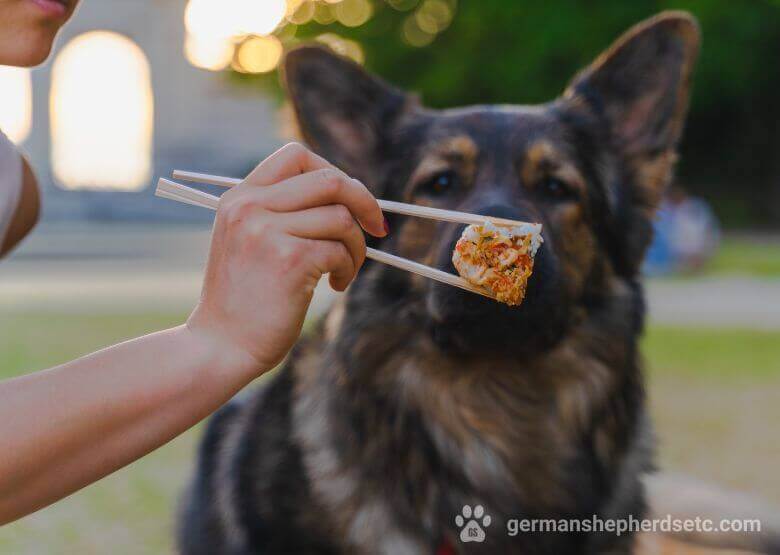
You can come across many tips on feeding your German Shepherd dog on the Internet. However, you had better talk to your vet first because your individual dog may have specific needs. There is no general answer to the question, ‘What can German Shepherds eat?’ It depends on the age and health condition of every dog. However, if your doggy is healthy, this guide can help you a lot, though.
You can also watch the feeding charts on the food packages. However, don’t treat them as the absolute truth. Such a chart can just be a starting point. You have to watch your dog and its needs to notice any changes in its weight, activity, potty habits, and energy levels. You may need to make some changes or completely adjust the meals to your specific case.
Be sure that such charts show the overall daily intake, but not the amount of food for one portion. For instance, if you see that your dog should eat 3 cups, it means you need to divide them into 2, 3, or 4 meals according to your puppy’s needs and habits. You can also ask your vet how you can split the overall amount better.
Make Your New Puppy Feel Positive About Eating
When you bring a new pup home, it feels stressed. You have to arrange its feeding place and time in a positive way. Don’t feed the puppy in a noisy and crowded place with a lot of distractors. Fresh water should be present at this place, too. Don’t try to take the bowl away from the pup, play with it, or pat it while it is eating. You can sit somewhere around to make it a company, but without any intrusions.
Give It Treats
You can offer some fresh treats in small portions alongside the kibble. Though, don’t make treats too big and too often because your puppy can start living on them and ignoring its main food. Be attentive to the number of calories such treats may contain. They can have only under 10% of the overall daily calories because your doggy may start gaining weight.
You can use different kinds of food as treats, such as:
- frozen or fresh blueberries;
- carrots, either fresh or cooked;
- canned pumpkin;
- several teaspoons of Greek yogurt without sugar;
- plain oatmeal, cooked without sugar;
- eggs, either boiled or scrambled;
- goat’s milk.
You can find some other variants of treats on the Net. However, avoid human food as much as possible – it won’t do much good to your pup.
BARF Diet
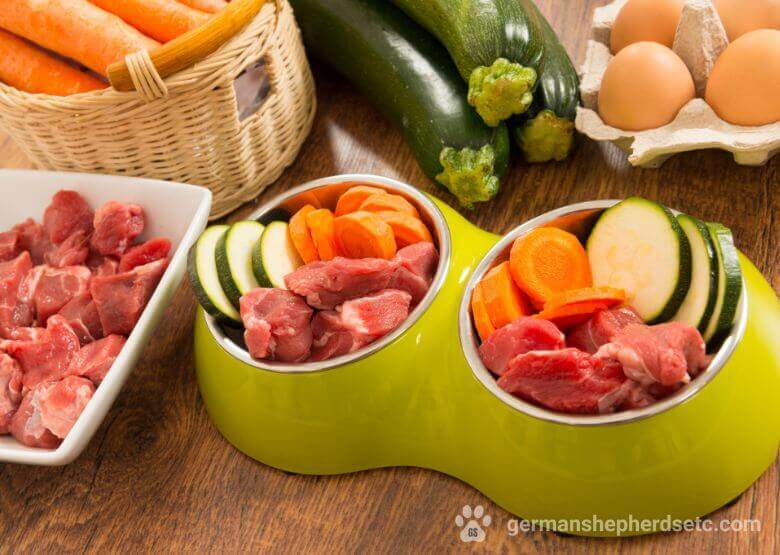
Many GSD owners are interested in the BARF diet. It is an acronym for Bones and Raw Food. The supporters of such an approach believe that, since the dogs are canine pack animals, in the wild they used to feed on prey and certain amounts of vegetation. This food for German Shepherd dogs is the most natural option. Like many other diets, it has its advantages and disadvantages.
Among the apparent advantages, let’s consider the following:
- This food will provide your doggy with healthier skin and coat and more energy.
- Your dog will have bright, healthy eyes, clean gums, and teeth.
- You won’t care about possible allergic reactions.
- The bones and joints of the animal will remain strong and healthy for a long time.
- Your dog’s digestion will be better, so the breath will be fresher, and the disposition will improve.
- This diet does not cause obesity because it does not contain grains.
- The food does not contain chemicals, preservatives, or additives, and it is lower in carbohydrates.
However, there are some drawbacks, and the main of them are:
- The raw meat may contain bacteria, E.coli, salmonella, or harmful contaminants.
- This food should be extremely fresh.
- You need to watch your dog because bones can cause airway obstruction or choke.
- This diet may lead to diarrhea and gastrointestinal inflammation in some dogs that are not accustomed to it.
- Raw meat can be rather expensive.
You can include ground beef, muscle meat, bones, kidney, liver, and other types of meat. Add some vegetables, like celery or spinach, fresh fruit, plain yogurt, and other dairy products, raw eggs, making this diet an excellent healthy option for your German Shepherd.
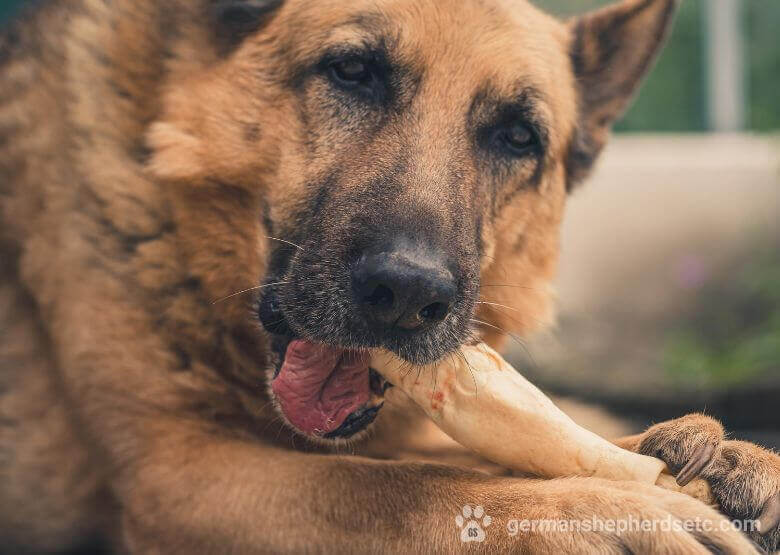
Home Cooking for Your Dog
As with the raw food diet, preparing a home-cooked diet for your German shepherd puppy or adult dog gives you control over what it eats. You know all the ingredients without worrying about any additives or harmful components of what your dog is being fed. Some of the outstanding benefits of a home-cooked dog diet, aside from the control you have over what your dog eats, are that this way of feeding is cost-effective, appetizing, and healthy. Most dogs on this diet do not suffer from allergies and gastrointestinal problems.
This is a good way to detoxify your dog, and many cancer patients benefit from a home-cooked meal. This is of course another excellent and specific German Shepherd food. Although there are a few, the cons are minimal and include your time and effort in cooking the foods your GSD will be eating. It may be difficult to provide a balanced diet with this way of eating and require some supplements for your canine. Different dogs may have varied nutritional needs. For instance, a German Shepherd puppy requires a diet that is vitamin enriched and higher in proteins, minerals, and essential fats necessary for healthy growth. A healthy puppy leads to a vibrant, wholesome, and happy adult dog.
Special Needs in Food
The German Shepherds have special needs in food because of their short colon compared to other breeds. As a result, a high fiber diet is necessary to slow the process of food through the body, so all nutrients are absorbed before food is eliminated. If cooking for your dog, choose lean fresh beef along with healthy wheat and green vegetables like broccoli, alfalfa, and cabbage. Be sure to avoid any soy products, fish, and rice. Most foods should provide the necessary Vitamins of B, E, Folic Acid, Biotin, Calcium, Iodine, Iron, Manganese, Magnesium, Zinc, and Potassium. Cooking for your dog provides the best balanced and nutritional foods without any added preservatives, colors, and dyes.
Giving Water to German Shepherds
The amount of water you give your German Shepherd per day can vary due to its size, weight, activity level, and age. On average, you can offer it 2-3 cups daily. Remember that younger dogs need more water per day than adult ones. Dogs that exercise or work a lot may need more.
You do not need to closely follow how much water your dog drinks – it can hydrate itself properly if it has free access. The average norms are 6 ounces (170 g) per every 7.7 lbs (3.5 kg) per day. So, if your dog weighs 77.2 lbs (35 kg), it needs about 60 ounces (1,700 g) of water. However, that may depend on the temperature of the environment, too. If it is hot, this amount should be higher.
You do not need to do anything special about providing your dog with water, either. Just fill a bowl with a small amount of water. Do not pour too much. Add water if you see that your dog has gone out of it. Anyway, you need to talk to the vet about the individual water needs of your dog.
Don’t Let Your Dog Exercise After Feeding
Your pup needs the time to digest the food. Avoid playing hard with it immediately after feeding. You need to wait at least 2 hours before any energetic activity because heavy exercising can lead to severe gastric problems. Instead, you can offer your pet a slow walk, without running, if it is possible.
Or you can start teaching your puppy balance skills and coordination with some quiet games. These gentle exercises can help your little one avoid injuries, keep their joints healthy, and learn how to socialize.
Frequently Asked Questions
At what time is it best to feed my dog?
The best time for feeding is in the morning before you leave for work and in the evening when you come back home. It should be two hours before your puppy goes to bed. Let it potty for more comfort 20 minute-half an hour after the meal.
If your puppy needs to eat 4 times per day, the best time is: in the morning, at midday, in the afternoon when you come back home, and in the late evening. When it is a three-time feeding routine, the best time is in the morning, early in the afternoon, and in the evening. When your dog is older than 12 months of age, you can feed it twice per day, in the morning and in the afternoon. Remember that the feeding hours should remain the same day by day.
What to do if my GS puppy does not want to eat?
That may be an issue, so you need to see why your puppy refuses to eat. If a pup does not have an appetite for a short time, it is not a problem at all. It will come back to the usual routine in a while.
However, if the pup loses appetite for a few days, you need to show it to the vet. It can feel bad. If the vet tells you that your doggy is ill, they prescribe a specific diet to enhance their immunity and some additional nutrients for faster recovery.
Sometimes, the puppy may stop eating because of some psychological issues, so you need to start feeding it at the same time, and the problem will be solved. Do not try to give your little one human food to interest it. If there is a problem, this method will not work.
Can I free-feed my GS puppy?
Therefore, what do German Shepherds eat? How often do they eat? German Shepherd dogs are a medium breed, so it is not a good idea to free-feed your pet. Establishing schedules and outlines will be more beneficial for it. The puppy can overeat because, if the leftovers are available, it can eat them even if it is not hungry. Over time, that may result in obesity. With the feeding routine, you can easily manage its weight and healthy development. Moreover, you may have a lot of potty accidents because puppies tend to relieve themselves 15-20 minutes after eating, but you will never know whether your pet has eaten something or not and when to take it outside.
Can I offer supplements to my GS puppy?
The commercial kibble is well-balanced and high-quality. Your puppy will receive everything it needs with it. So, there is no use in giving it any supplements. A lot of additives and vitamins can even do harm. However, if your vet insists on giving supplements for some reason, they will prescribe canine-safe preparations only for some specific needs. Do not use human supplements. They may contain substances that are severely harmful to your dog.
Final Thoughts
Be attentive about how you feed your German Shepherd. Give it high-quality foods with well-balanced amounts of vitamins and minerals at every stage of its life. Look at the list of the ingredients before buying the dog’s food. If these ingredients are doubtful, why should you feed them to your puppy? You can also follow a German Shepherd feeding chart provided on the packaging or in this article. Avoid cheap and generic food. Invest more in your dog’s health and well-being instead of saving some costs now for paying immense vet bills in the future.
Always watch your puppy’s growth, weight gains, energy levels, and behavior. You will see how much to feed your doggy, even if you do not know all about it yet. Try to follow this guide and the tips provided here. If you care about your puppy now, you will enjoy the best healthy and loyal companion for a long time.
